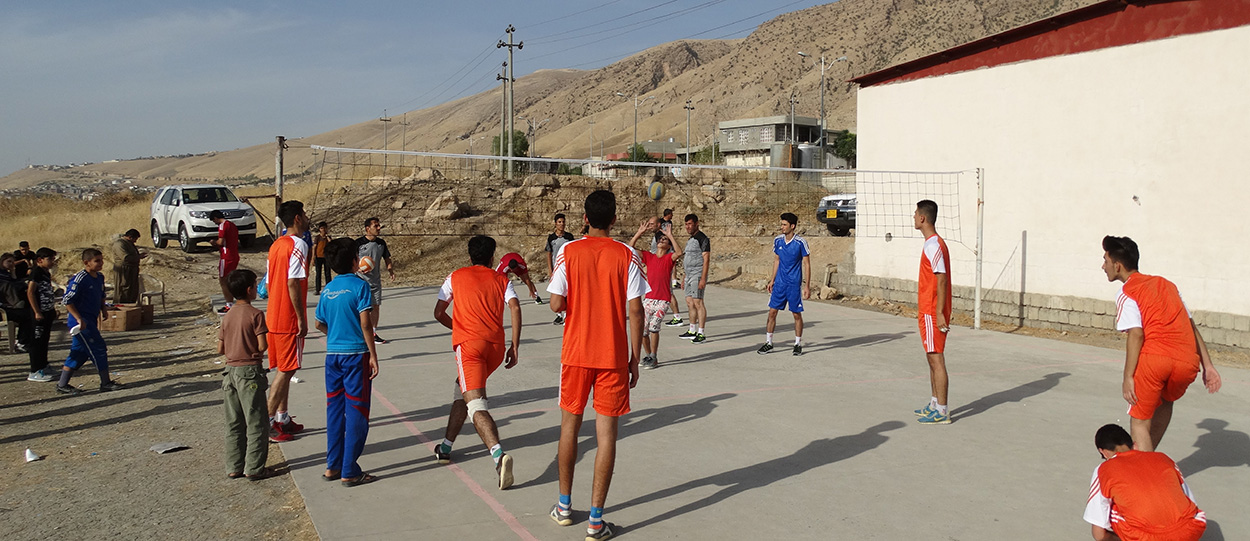Smashing tensions in Iraq, one volleyball tournament at a time

In 2016, 71 young Kurd and Arab men from Qamchugha took part in a volleyball tournament that brought their communities closer.
The first volleyball tournament held in Qamchugha, Iraq, was unlike other sports events: it broke barriers between Kurds and Arabs in the community.
Qamchugha is one of the oldest villages in Iraq’s Kurdistan Region. The majority of the village consists of Kurdish families who fled the violence and repression of the Anfal campaign—Saddam Hussein’s brutal late-1980s campaign, which killed between 50,000 and 100,000 Kurds, forcibly relocated thousands of others and moved Sunni Arabs into Kurdish homes.
In 2014, when Daesh began its assault on Iraqi territory, nearly a million Sunni Arabs fled their homes and resettled in Kurdish towns such as Qamchugha, where the community was wary of the newcomers. With little or no knowledge of Kurdish, the Arab families that had recently resettled soon realized that building relationships and trust with their Kurdish-speaking neighbours would be incredibly difficult. With suspicion, negative perceptions, cultural and language barriers and historical grievances between the two groups, Qamchugha quickly saw an increase in conflict.
Among the many differences, though, there was one similarity: young men from both communities had a love of sports.
Young Kurds and Arabs both spent much of their time playing soccer and volleyball in abandoned spaces and streets in and around the village. But while the Kurds would play in the local stadium, the Arabs did not have a dedicated space to play. Many of them felt uncomfortable entering the stadium to play alongside the young Kurds. In an attempt to avoid confrontation, the local anjuman, the community’s non-governmental leader, gave the young Arabs permission to use some nearby flat land to play.
For Mercy Corps, the common interest in sports was an opportunity to foster interaction and build bridges between communities. In October 2016, an unlikely possibility became reality: for an entire week, 71 young men—29 Arabs and 42 Kurds—formed mixed teams and competed in eight volleyball matches. The tournament immediately drew crowds, with both Kurds and Arabs cheering and enjoying the atmosphere of the games. The fans—neighbours, parents and relatives of team members—quickly began to mingle, like the players, discussing the matches and the good-natured competition.
Through this simple experience, the groups had a foundation from which to interact and build positive impressions of each other. At the end of the tournament, the players shared phone numbers, and started using the stadium to play sports every week together, in teams of mixed players. “Now that I know the other players, I feel more comfortable playing with them in the stadium”, a young Kurd said.
The program-organized volleyball tournament took place in 2016, but its impact is still noticeable in the community. Over a year later, young Kurds and Arabs continue to meet at the stadium every week for friendly matches of soccer or volleyball.
“I never thought that playing on the same team as a Kurd would ever happen.”
Promoting social cohesion in Iraq
Since the beginning of the war in Iraq, in 2014, more than 3 million people—almost one Iraqi in 10—have been forced to leave their homes, becoming internally displaced persons. In response to this crisis, Canada is providing humanitarian assistance, stabilization support and development and diplomatic assistance to Iraq in line with the Government of Canada’s Middle East engagement Strategy.
An important element of the Middle East Strategy was the Promoting Social Cohesion in Iraq project. Through this initiative, Canada provided $4.5 million to Mercy Corps to relieve tensions between, on one side, families forced to flee their towns and cities and, on the other, the communities where they resettled. Mercy Corps is a global humanitarian organization that empowers people to recover from crises, build better lives and change their communities for the good.
Between April 2015 and August 2017, over 20,000 women, girls, men and boys from Iraq’s Diyala and Sulaymaniyah governorates benefited from more than 100 community projects launched with this funding. To learn more, visit Promoting Social Cohesion in Iraq.
- Date Modified:


